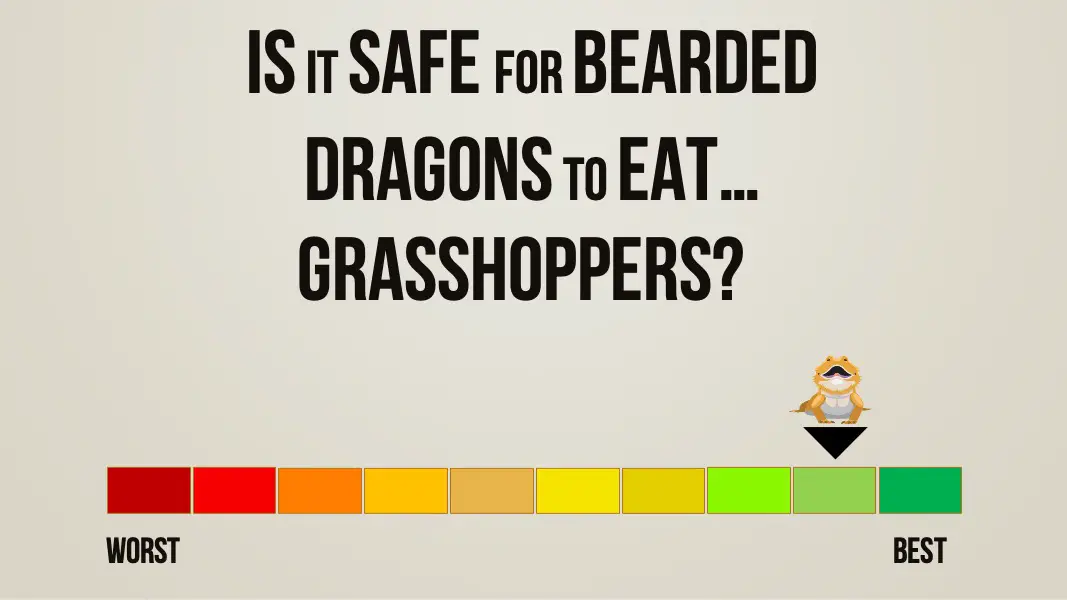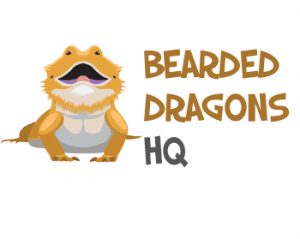Yes, bearded dragons can eat grasshoppers. One of the most important aspects of keeping your bearded dragon pleased is to provide them with a nutritious diet. As reptile caretakers, we should make every effort to offer our animals food that they would normally obtain in the wild.
And since eating insects is a large part of their natural diet, it only makes logical that they should eat particular bugs. But can they feed on grasshoppers? Check out the list of insects for bearded dragons

What Does a Bearded Dragon’s Diet Look Like?
Let’s have a look at what a dragon’s food includes and how grasshoppers can contribute to the dragon’s nutrition.
The food of a bearded dragon includes a range of fruits, vegetables, and animal-sourced protein, the majority of which are insects. Because bearded dragons are omnivorous, these insects are essential required for them to survive. They are unable to just consume plant-based foods. They require a sufficient amount of protein in their diet in order to receive adequate nutrition.
Consequently, if you’re apprehensive about bugs, you’ll have to get over your aversion.
The amount of protein they need will change as they grow bigger and older. For example, during their initial months, a beardie will require extra protein. As they get older, their bodies will require a more herbivorous diet to keep them healthy.
Grasshoppers include a variety of nutrients.
Grubs and mealworms are among the insects that bearded dragons enjoy eating, but grasshoppers are also among their favorites. Consider the nutrients that your reptile friend can acquire from a single serving of grasshoppers.
Grasshopper Nutrients
Protein – Grasshoppers are not just high in protein but also an excellent source of enzymes.
Iron – Iron deficiency can be a big problem for bearded dragons, especially when they’re molting. Because grasshoppers are full of iron, the reptile is able to stay healthy regardless of their molt cycle.
Calcium – Calcium deficiency leads to brittle bones and teeth which makes it difficult for the dragon to function freely. Consequently, calcium-rich food items like grasshoppers are essential to make sure your pet stays strong and healthy.
Vitamin A – Vitamin A will help improve the overall state of your dragon’s vision as well as its ability to fight off infections by strengthening its immune system. If you want them to live a long and healthy life, offer them insects like grasshoppers.
Healthy Fats – Of course, all of these nutrients won’t help your bearded dragon if it isn’t getting any fat from the meal as well. Fortunately, grasshoppers contain both omega-3 and omega-6 fatty acids which are great for their skin, brain, heart, and teeth.
According to what we’ve seen so far, grasshoppers can supply an incredible amount of nutrition. We propose that you include grasshoppers as a regular part of your bearded dragon’s diet on a regular basis.
What is the maximum number of grasshoppers that my bearded dragon can consume?
Even while bearded dragons love to eat grasshoppers, it is vital that you only serve them the proper amount each time.
The first thing to accept is that your bearded dragon will have to eat different insects apart from grasshoppers. You wouldn’t like to be forced to eat the same thing every single day, would you?
Well, your bearded dragon doesn’t think so, either.
Instead, provide grasshopper dinners once a week. His enjoyment of other insects will not be diminished, and he will still be able to appreciate his old favorite.
When your dragon is a newborn, their daily meal should consist primarily of protein, with the remaining 30% being carbohydrates. To guarantee that they grow into big, powerful, and healthy adults, they must be fed every three hours.
But how can you determine whether a certain number of grasshoppers is sufficient? It all depends on the situation.
How big do your grasshoppers grow to be? What is the hunger level of your lizard? Is your bearded dragon in the mood to embark on a hunting expedition? A discussion with an exotic veterinarian will assist you in determining the appropriate number of vaccinations for your beardie’s age and size.
Bearded dragons, on the whole, don’t consume too much or too little. And when they’ve had enough, they’ll just quit eating altogether. However, this does not imply that you should leave uneaten grasshoppers in their enclosures.
Insect List for Bearded Dragons
- Can Bearded Dragons Eat Darkling Beetles
- Can Bearded Dragons Eat Dead Crickets
- Can Bearded Dragons Eat Dubia Roaches
Can A Bearded Dragon Eat Grasshoppers From The Wild?
Bearded dragons are primarily wild, omnivorous reptiles and they feed on many different insects. So, it could seem only natural that it’s safe for them to devour grasshoppers you’ve collected from your garden.
Unfortunately, such is not the reality.
Some wild grasshoppers, particularly those located in urban and agricultural environments, may well have been subjected to and come into contact with pesticides. These toxins have the potential to be quite destructive to your small reptile companion.
Don’t put their health at danger by exposing them to wild grasshoppers.
You should only give them grasshoppers that come from a reputable vendor or pet store—or those you produce expressly at home.
Other Insects Bearded Dragons Can Eat
Give these insects a try while feeding your beardie:
- Roaches are a type of insect (dubia roaches)
- Mealworms
- Phoenix Worms
- Crickets
- Silkworms
- Crickets
- Waxworms
- divider-bearded dragon
Bearded Dragons Can Eat Grasshoppers
Bearded dragons love grasshoppers, and while they may not be a particularly appetizing snack for most of us, they are an important part of their diet. They’re inexpensive, nutritious, and delicious—at least for your bearded dragon.
But keep in mind that you shouldn’t eat grasshoppers that have been caught in the wild because you don’t know where they came from. And they may be transporters of insecticides or other toxins.
Summary
While grasshoppers are an important part of the bearded dragon’s diet, you should still try to introduce other insects into their diet.
These new creatures will enhance the diversity of your dragon’s nutritional intake and make them happy!

